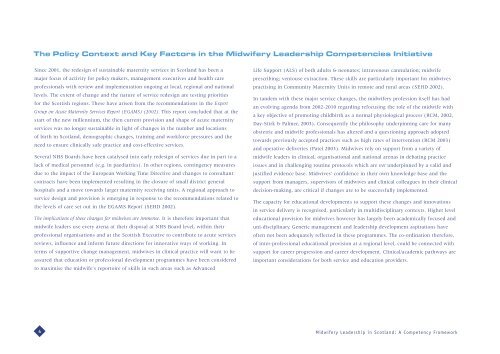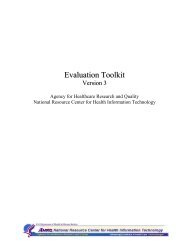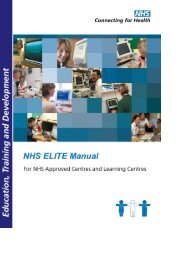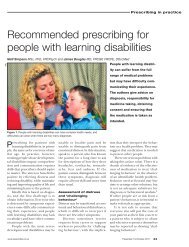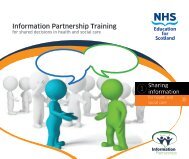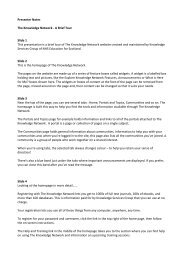Midwifery Leadership - The Knowledge Network
Midwifery Leadership - The Knowledge Network
Midwifery Leadership - The Knowledge Network
Create successful ePaper yourself
Turn your PDF publications into a flip-book with our unique Google optimized e-Paper software.
<strong>The</strong> Policy Context and Key Factors in the <strong>Midwifery</strong> <strong>Leadership</strong> Competencies Initiative<br />
Since 2001, the redesign of sustainable maternity services in Scotland has been a<br />
major focus of activity for policy makers, management executives and health care<br />
professionals with review and implementation ongoing at local, regional and national<br />
levels. <strong>The</strong> extent of change and the nature of service redesign are testing priorities<br />
for the Scottish regions. <strong>The</strong>se have arisen from the recommendations in the Expert<br />
Group on Acute Maternity Services Report (EGAMS) (2002). This report concluded that at the<br />
start of the new millennium, the then current provision and shape of acute maternity<br />
services was no longer sustainable in light of changes in the number and locations<br />
of birth in Scotland, demographic changes, training and workforce pressures and the<br />
need to ensure clinically safe practice and cost-effective services.<br />
Several NHS Boards have been catalysed into early redesign of services due in part to a<br />
lack of medical personnel (e.g. in paediatrics). In other regions, contingency measures<br />
due to the impact of the European Working Time Directive and changes to consultant<br />
contracts have been implemented resulting in the closure of small district general<br />
hospitals and a move towards larger maternity receiving units. A regional approach to<br />
service design and provision is emerging in response to the recommendations related to<br />
the levels of care set out in the EGAMS Report (SEHD 2002).<br />
<strong>The</strong> implications of these changes for midwives are immense. It is therefore important that<br />
midwife leaders use every arena at their disposal at NHS Board level, within their<br />
professional organisations and at the Scottish Executive to contribute to acute services<br />
reviews, influence and inform future directions for innovative ways of working. In<br />
terms of supportive change management, midwives in clinical practice will want to be<br />
assured that education or professional development programmes have been considered<br />
to maximise the midwife’s reportoire of skills in such areas such as Advanced<br />
Life Support (ALS) of both adults & neonates; intravenous cannulation; midwife<br />
prescribing; ventouse extraction. <strong>The</strong>se skills are particularly important for midwives<br />
practising in Community Maternity Units in remote and rural areas (SEHD 2002).<br />
In tandem with these major service changes, the midwifery profession itself has had<br />
an evolving agenda from 2002-2010 regarding refocusing the role of the midwife with<br />
a key objective of promoting childbirth as a normal physiological process (RCM, 2002,<br />
Day-Stirk & Palmer, 2003). Consequently the philosophy underpinning care for many<br />
obstetric and midwife professionals has altered and a questioning approach adopted<br />
towards previously accepted practices such as high rates of intervention (RCM 2003)<br />
and operative deliveries (Patel 2003). Midwives rely on support from a variety of<br />
midwife leaders in clinical, organisational and national arenas in debating practice<br />
issues and in challenging routine protocols which are not underpinned by a valid and<br />
justified evidence base. Midwives’ confidence in their own knowledge base and the<br />
support from managers, supervisors of midwives and clinical colleagues in their clinical<br />
decision-making, are critical if changes are to be successfully implemented.<br />
<strong>The</strong> capacity for educational developments to support these changes and innovations<br />
in service delivery is recognised, particularly in multidisciplinary contexts. Higher level<br />
educational provision for midwives however has largely been academically focused and<br />
uni-disciplinary. Generic management and leadership development aspirations have<br />
often not been adequately reflected in these programmes. <strong>The</strong> co-ordination therefore,<br />
of inter-professional educational provision at a regional level, could be connected with<br />
support for career progression and career development. Clinical/academic pathways are<br />
important considerations for both service and education providers.<br />
4 <strong>Midwifery</strong> <strong>Leadership</strong> in Scotland: A Competency Framework


